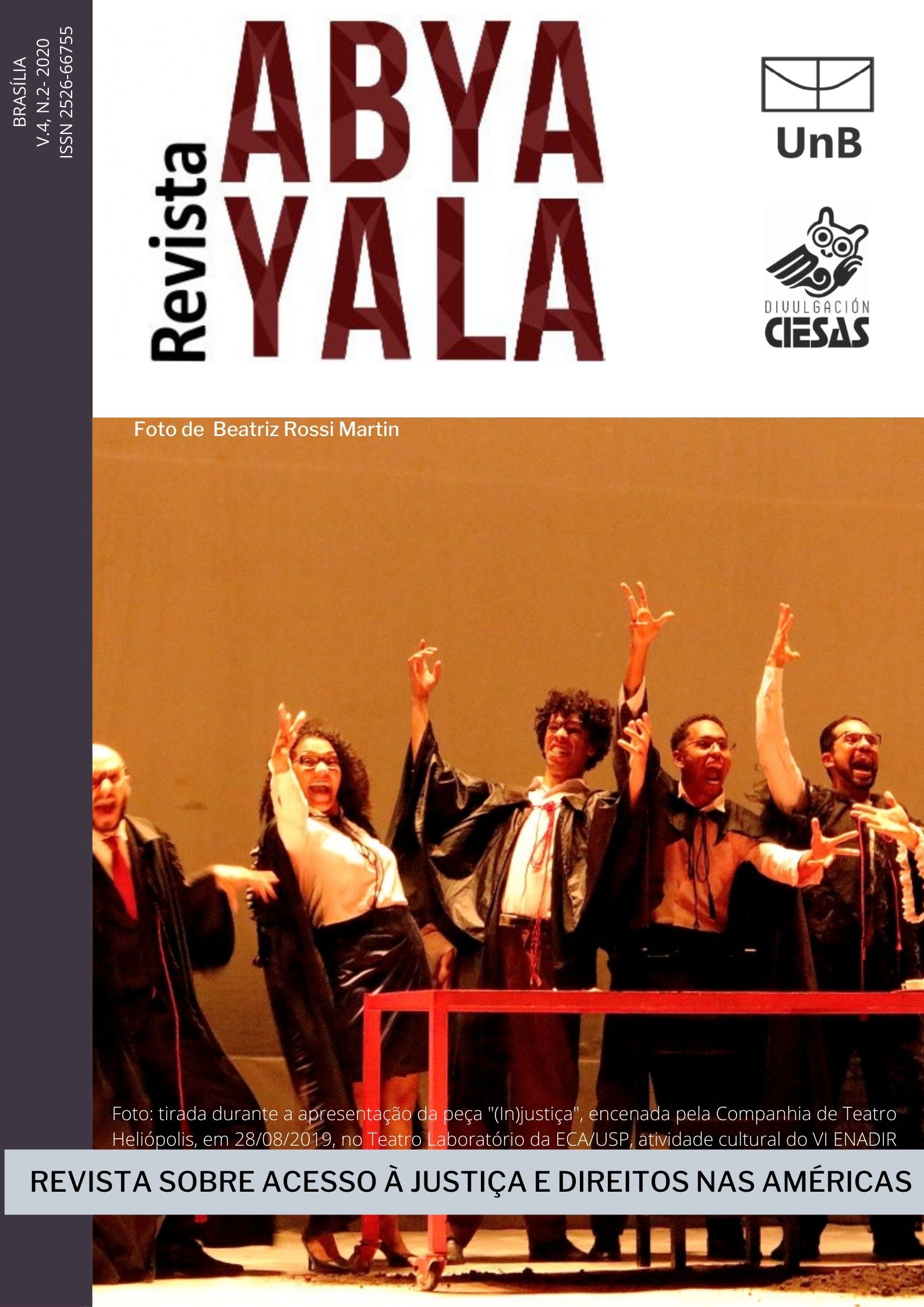CONSULTA TRAMPOSA: interpretations about the law crossed by politics
DOI:
https://doi.org/10.26512/abyayala.v4i2.34993Keywords:
Indigenous Politics, Previous Consultation, Bolivia, Amazon, Indigenous RightsAbstract
Isiboro Secure National Park and Indigenous Territory (TIPNIS) is one of the biggest indigenous territories in Bolivia. It is located between the lowlands and the highlands of the country, in an area called pies de monte. Three different indigenous peoples live there, divided through sixty-four communities scattered throughout the region. Since 2011, different TIPNIS’ indigenous leaders have been playing a prominent role in the national political field, mobilizing actors against and in favor of a governmental project of building a road through the territory. This paper analyzes different interpretations about a consultation carried out by the Plurinational State of Bolivia in 2012 on the referred project. The main objective of the article is to discuss how interpretations of indigenous rights, the right to prior consultation in particular, were cut short by the national political situation and modified by disputes over hegemony, revealing a complex and plural indigenous political field. The political polarization between government officials and opponents took place in the territory during the consultation, germinating in an environment of uncertainty and outcropping as division, distrust and aversion to politics. At least in that area, the consultation is not remembered as indigenous right’s victory, but as a moment in which “los políticos” imposed their will on communities.
Downloads
References
ALBÓ, Xavier. Una Mirada profunda al TIPNIS. In: CONTRERAS, A. Coraje, memorias de la Octava Marcha Indígena por la defensa del TIPNIS. La Paz: J.V. Editoras, 2012.
ALBUQUERQUE, Renata. Políticas Indígenas: análise a partir do Território Indígena e Parque Nacional Isiboro Sécure (TIPNIS). Tese de Doutorado. (DAN/UnB). Brasília, 2019.
BOLÃVIA, Informe final del proceso de Consulta Previa, Libre e Informada a los pueblos Moxeño-Trinitario, Yuracarpe y Chimane del Territorio Indígena y Parque Nacional Isiboro Sécure (TIPNIS), La Paz: 2012.
CHAVES, Cristhine de Alencar. A marcha nacional dos sem terra. Um estudo sobre a fabricação do social. Rio de Janeiro: Relume Dumará, 2000.
CHARRIS B., Juan Pablo. El consentimiento libre, previo e informado como garantía de transparencia en la administración pública. Revista Derecho del Estado n. 33, p. 123-147, 2014.
CIDOB; CONAMAQ; COICA; CAOI. Pueblos en el camino en defensa de los territorios. Bolivia, 2012.
CONTRERAS, Alex. Etapa de una larga marcha. La Paz: Asociación AQUÃ Avance, 1991.
_________________. Coraje, memorias de la Octava Marcha Indígena por la Defensa del TIPNIS. La Paz: J.V. Editoras, 2012.
GÚZMAN, Ismael. Octava Marcha Indígena en Bolivia. Por la defensa del territorio, la vida y los derechos de los pueblos indígenas. La Paz: CIPCA, 2012.
LEHM, Zulema. Milenarismo y Movimiento Sociales en la Amazonia Boliviana: la búsqueda de la Loma Santa y la Marcha Indígena por el Território y la Dignidad. Santa Cruz de la Sierra: OXFAM, America, 1999.
PAZ, Sarela. El conflicto del Territorio Indígena y Parque Nacional Isiboro Sécure (TIPNIS) y sus consecuencias para el Estado Plurinacional de Bolivia. In: BAUTISTA, R.; CHÁVEZ, M.; CHÁVEZ, P.; PAZ, S.; PRADA, R. TAPIA, L. La Victoria Indígena del TIPNIS. La Paz, p. 11-68, 2012.
MORAES, Renata. Desenvolvimento e Vivir Bien. O caso do Território Indígena e Parque Nacional Isiboro Sécure (Bolívia). Dissertação de mestrado. (CEPPAC/UnB). Brasília, 2014.
SANTAMARÃA, Alejandro. La consulta previa desde la perspectiva de la negociación deliberativa. Revista Derecho del Estado, n. 36, p. 227-247, 2016.
SCHAVELZON, Salvador. Mutaciones de la identificacion indigena durante el debate del censo 2012 en Bolivia: mestizaje abandonado, indigeneidad estatal y proliferacion minoritaria. In. ANGOSTO-FERNINDEZ, Luis e KRADOLFER, Sabine (Ed.) The Politics of Identity in Latin American Censuses. London and New York: Routledge, p. 8-34, 2016.
Downloads
Published
How to Cite
Issue
Section
License
Copyright (c) 2020 Abya-Yala: revista sobre acesso à justiça e direitos nas Américas

This work is licensed under a Creative Commons Attribution-NonCommercial 4.0 International License.
The sending of contributions to Abya Yala implies the assignment of copyright and publication to the Journal, observing the Attribution-Non-Commercial 4.0 International (CC BY-NC 4.0) adopted.
The content of the texts submitted to and published by the journal will be the sole responsibility of their respective authors.
Copyright: https://creativecommons.org/licenses/by-nc/4.0/deed.en





